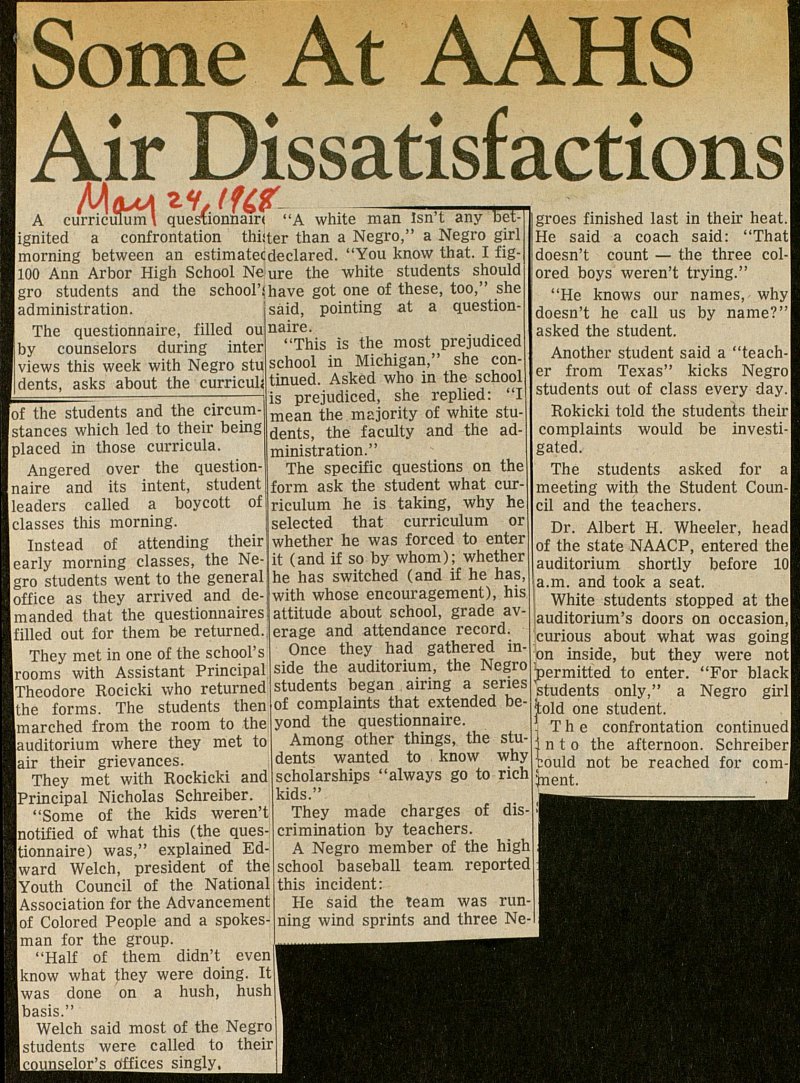Some At AAHS Air Dissatisfactions

A curriculum questionnairt ignited a confrontation thi morning between an estimatec 100 Ann Arbor High School Ne gro students and the school'} administration. The questionnaire, filled ou by counselors during inter views this week with Negro stu dents, asks about the curriculi of the students and the circumstances which led to their being placed in those curricula. Angered over the questionnaire and its intent, student leaders called a boycott of classes this morning. Instead of attending their early morning classes, the Negro students went to the general office as they arrived and demanded that the questionnaires filled out for them be returned. They met in one of the school's rooms with Assistant Principa iTheodore Rocicki who returned the forms. The students then marched f rom the room to the auditorium where they met to air their grievances. They met with Rockicki and Principal Nicholas Schreiber. "Some of the kids weren't notified of what this (the questionnaire) was," explained Edward Welch, president of the Youth Council of the National Association for the Advancement of Colored People and a spokesman for the group. "Half of them didn't even know what they were doing. It iwas done on a hush, hush basis." Welch said most of the Negro students were called to their Icounselor's offices singly. "A white man lsn't any bet;er than a Negro," a Negro girl ieclared. "You know that. I figure the white students should have got one of these, too," she áid, pointing at a questionaire. "This is the most prejudiced chool in Michigan," she con;inued. Askêd who in the school s prejudiced, she replied: "I mean the majority of white stuents, the faculty and the administration." The specific questions on the orm ask the student what curriculum he is taking, why he selected that curriculum or whether he was forced to enter t (and if so by whom); whether ie has switched (and if he has, with whose encouragement), his attitude about school, grade average and attendance record. Once they had gathered inside the auditorium, the Negro students began airing a series of complaints that extended beyond the questionnaire. Among other things, the students wanted to know why schoíarships "always go to rich kids." They made charges of dis crimination by teachers. A Negro member of the high school baseball team. reported this incident: He said the team was running wind sprints and three groes finished last in their heat. He said a coach said: "That doesn't count - the three colored boys weren't trying." "He knows our names, why doesn't he cali us by name?" asked the student. Another student said a "teacher from Texas" kicks Negro students out of class every day. Rokicki told the students their complaints would be investigated. The students asked for a meeting with the Student Council and the teachers. Dr. Albert H. Wheeler, head of the state NAACP, entered the auditorium shortly before 10 a.m. and took a seat. White students stopped at the auditorium's doors on occasion, curious about what was going on inside, but they were not ipermitted to enter. "For black students only," a Negro girl jtold one student. I T h e confrontation continued n t o the afternoon. Schreiber tould not be reached for com-, jnent.